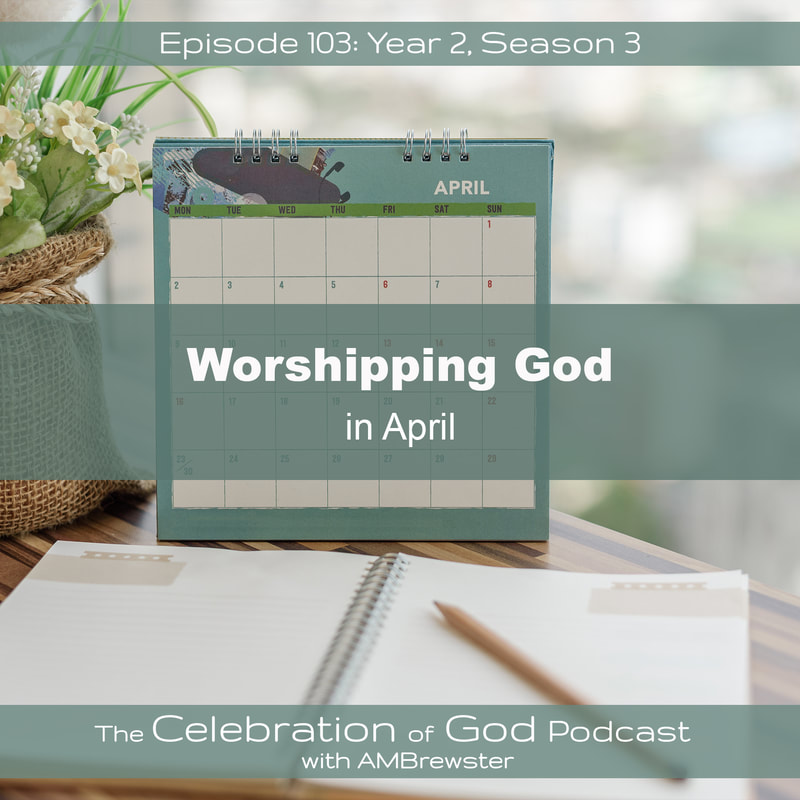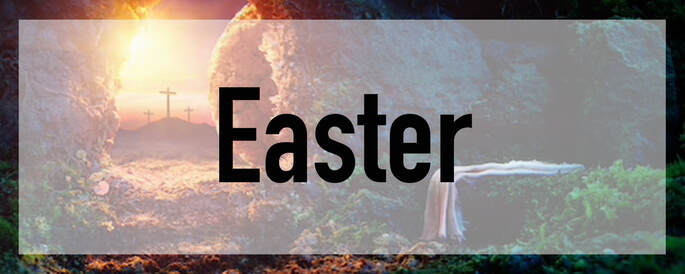Are you new to the Celebration of God? Click here for your first steps.TranscriptIntroduction
First, let me start by saying that we have a bunch of fantastic free resources for you today at CelebrationOfGod.com.
We want you to really enjoy praising and adorning and exalting God this April, and there are so many High Days and Low Moments this month to do so. We pray you will worship God better this year than you did last year. So, make sure you visit CelebrationOfGod.com for today’s free episode notes, transcript, and April Holiday resources, and also make sure to follow us on social media so you can access various worship prompts throughout the day. Okay, so why is April such an amazing month? Topic
Well, it doesn’t really have anything to do with the changing of the seasons. Yes, in the Northern Hemisphere Spring is already in full swing or just ramping up, and in the Southern Hemisphere you’re moving into Autumn, but regardless of the weather, it’s the holiday celebrations in the month of April that are so amazing.
And the main celebration of the month is Resurrection Sunday, which lands in April more often than it does in March, but we’ll talk about that in a few minutes. Before we get into the specifics of the various observances, celebrations, and solemnities, let’s remind ourselves about the seasonal focus of April. April is the second month in the Season of Life. That means that we are studying and meditating on and praising God for life — physical life and provision as well as spiritual life and provision. I look forward to doing a future series on the biblical realities of life. The biblical truths about the life of God is so rich and encouraging and challenging. But life is not the only thing we’re staying this season. We’re also taking these three months to learn more about and glory in justification. Justification is the moment that we are pronounced righteous before the Father and our names are written in the Lamb’s Book of Life. You should also look forward to an extended Celebration of God series on Justification in the future. Understanding even the most superficial details of our salvation is such a necessary catalyst for how we relate to God and others. And April is an especially wonderful time to celebrate both Life and Justification because April is the month in which we most often celebrate the act that purchased our justification and eternal life. And that act was the death, burial, and resurrection of our Lord and Savior Jesus Christ. So, now let’s talk about the various elements that are part of a robust Resurrection Celebration. Most Christians are familiar with three main days during Eastertide. The first is Palm Sunday, and then there’s Good Friday and Resurrection Sunday — otherwise known as Easter. Again, most Christians likely at least acknowledge these three days. But it’s our desire that you not merely acknowledge them, but that you revel in them to the glory of God — but not just these three days, but all six days of the Passion and Resurrection. But not just those 6 observances, but also the other two holidays in April. But not just those eight celebrations, we also want you to revel in God every day in April. So, let’s start by looking at the April High Days, and then we’ll discuss a bunch of the other Low Moments. 1. Palm Sunday The first High Day of our Eatertide celebration is the first day of what is often called Holy Week or the Passion Week, and that day is colloquially called Palm Sunday because it was the day Jesus was welcomed into Jerusalem with plan branches and shouts of Hosanna. This is also known as the Triumphal Entry. This is an important day that can rightly be celebrated to God’s honor and glory because it lines up with the Jewish tradition of choosing the Paschal Lamb on Nisan 10. Nisan is a month in the Jewish calendar that holds a lot of significance. You can check out Exodus 12:3 to learn more. But for our purposes today, it’s important to know that Jesus was symbolically selected as the Passover Lamb and — over the course of the next 4 days — would live among the people and be tested just as a passover lamb would be. This makes a celebration of Palm Sunday a special time to focus on a few key points.
Now, generally speaking, not much attention is given to the Monday and Tuesday of Passion Week. However, these days have significance because the symbolism of Christ as the perfect sacrificial lamb continues through these two days. Traditionally, the sacrificial lamb would be chosen on the 10th and then be taken home for the next four days. The lamb would often eat and sleep with the family. This was done in order for the family to bond with the animal so that they would appreciate its sacrifice that much more. But it was also done so that they lamb could be thoroughly investigated to be certain that it matched the expectations for perfection. It wasn’t allowed to have any color or physical blemishes of any kind. In much the same way, Jesus spent the next few days in Jerusalem being known by the people. A large portion of Jesus’ recorded teaching was given during this time. There were tender interactions as well as times of significant conflict. And through it all Jesus was identifying Himself as the sinless sacrifice of God. And for those who loved Him, He was continuing to endear Himself to them. Now, what comes next in the Passion Week is disagreed upon by two major camps. However, I will not go into the disagreement here. We have a number of amazing resources that carefully walk through the disagreement and present the arguments for them. Please visit the link in the description of today’s episode to see our other Easter Resources that will give you tons of amazing information on how to worship God during this season. Suffice it to say, the Year Long Celebration of God functions from the perspective that Jesus was crucified on Thursday (not Friday), which means that the next major event on the Eastertide calendar is . . . 2. Maundy Wednesday The word “Maundy” refers to the new command that Jesus gave His disciples during His final teachings before the Crucifixion. Maundy Wednesday is an observance of Christ’s anointing, the washing of the feet, the Lord’s Supper, and the subsequent teaching in the Upper Room, on the Mount of Olives, and in Gethsemane. Therefore, observing the Lord’s Supper is another wonderful opportunity to exalt God because it gives a specific corporate opportunity to reflect on Christ’s New Commandment teaching. I won’t go into all of it here, but this teaching encompasses both an explanation of Christ’s personal sacrifice, the life we should live having become beneficiaries of His sacrifice, and a command to remember Chris’s sacrifice. And from there we have . . . 3. Good Thursday Four days after the Paschal Lamb was chosen, it would be sacrificed as a figurative covering for the sins of the one offering it. This occurred on Nisan 14 — on the Passover. Again, if you’ve always thought that the Passover and death of Christ occurred on a Friday, please check out our two part series called "The Confusion of the Crucifixion.” This will explain the biblical timelines so that it will all make sense. Either way, we know that Jesus was literally and historically crucified, but He purposefully laid down His life for a substitutionary sacrifice. Though the Crucifixion is one of only three Solemnities observed during our celebratory year, it’s so important to take note of them. The Crucifixion is both terrible and beautiful, discouraging and encouraging, sad and yet a most joyful occasion. It will definitely be a blessing to any child of God to carefully reflect on the Crucifixion as part of their Resurrection celebration. And then the next two days are often under-appreciated. 4. Holy Friday & Holy Saturday (end of Lent) Jesus was put into the tomb on the day we would reckon as Thursday evening. But regardless of how you count the days, Jesus was in the tomb for three days and three nights. That means that Thursday, Friday, and Saturday evening were the three evenings, and Friday, Saturday, and Sunday morning were the three mornings. This means that Jesus spent the full 48 hours of Friday and Saturday in the grave. Now, there’s a lot of conjecture about why God ordained three days and three nights in the grave. Some believe Jesus was actually accomplishing things during this time, and some believe it was merely the time God decreed was necessary. However, though the Scriptures do not provide detailed clarity on what Jesus was “doing” on these days, Christians can benefit from reflecting on the fact that it was all part of God’s plan. It’s also really valuable to consider the first century disciples. Their Messiah, their Teacher, their Friend, had just been brutally murdered for a crime He didn’t commit. The one they believed was going to overthrow the Roman government and physically rule as king in the first century was not dead. Consider the trial of faith, consider the questions, consider the heartbreak. Again, we don’t often look on these days as a typical colors and lights type of holiday. It may seem hard to “celebrate” God on these days because they lack fanfare and exultation. But the reality is that God works through hard things. God is not a victim of suffering, He’s the author of suffering because He has decreed that it is a vital part of the Christian’s sanctification. These dark moments spent in the Valley of the Shadow of Death are so important because they are designed to focus our attention on the One Who can cause us to fear no evil when everything around us seems saturated with nothing but evil. We believe that the follower of Christ can greatly benefit from meditating on these — and many more — realities of Holy Friday and Saturday. By the way, Holy Saturday also marks the official end of Lent. All that fasting is about to be broken by the most glorious celebration of all time. Because the next event on the calendar is the day for which we’ve all been waiting . . . 6. Resurrection Sunday Resurrection Sunday always falls between March 22nd and April 25th. That means that sometimes March gets to be the month we experience this parabola of joy, sadness, and joy. And I’m not going to take a lot of time telling you what you already know about the many ways to celebrate God on Easter. But I will encourage you to listen to our three part Celebrating God on Easter Series for more ideas. And those are the 8 days of the Passion Week. But there are still two other holidays in April as well as a ton of other opportunities to worship God. The first of which is . . . 7. Stewardship Day Stewardship Day is on April 22nd, and it’s also The Year Long Celebration of God’s redeemed take on Earth Day. Instead of celebrating the Earth, God’s people celebrate the God of the Earth by renewing their commitment to the Creation Mandate. Check out the link in the description of today’s episode for more resources about how to celebrate Stewardship Day. And then there’s . . . 8. The Historical Easter By the grace of God and modern science, researchers have been able to identify April 25th, AD 34 as the actual Sunday that Jesus rose from the dead. Obviously, April 25th doesn’t always land on a Sunday, and I believe there’s value to observing the days of the Passion on the actual days of the week that Jesus experienced them. But I also see real value in being able to celebrate with certainty the actual day, so many years ago, that Jesus actually rose from the dead. Of course, none of this is about a day or an event, it’s just another opportunity for us to stop and praise God for unspeakable gift! And those, my friends, are the holidays of April . . . at least many Aprils. But whether Resurrection Sunday falls in April or March this year, April is still packed with ripe opportunities to worship God. So, lastly, let’s consider worshipping God with . . . 9. Daily Life This year I have striven to expand our library of resources for celebrating God when it’s not an official holiday. Yes, we will always emphasize exalting God on each and every Christian holiday of the year. They are important and a wonderful part of a healthy preoccupation on God. But followers of Christ must be equally dedicated to following Christ on the non-holidays of the year. So, we have a number of podcast episodes about celebrating God in daily life which include Celebrating God at Church, Celebrating God at Work and School, as well as Celebrating God with our Recreation and even with Death. In addition, we have a number of series that deal specifically with the nature and expectations for our daily worship and discipleship. We pray each of those resources will equip you to be a better follower of Christ this year than you were last year. Conclusion
Well, I hope you’re looking forward to April as much as I am. So, please share this episode on your favorite social media outlets so that other disciples of Christ can join us in the excitement, and join us next time as we seek to better know, love, and worship God and help the people in our lives do the same.
To that end, we’ll be discussing the current Sabbatical Year we’re in, but — more importantly — what that means for Christians for the next seven years.
0 Comments
Leave a Reply. |
The Year Long Celebration of God is a dynamic, holistic resource that utilizes the Bible, our holiday calendars, and even the most average moments of the most normal days to equip Christians to worship God all year long
and disciple others to do the same. AMBrewster is the creator and host of the Celebration of God. He originally designed the COG to be a discipleship tool for Christian parents to train their children to know and love God, but he quickly realized how valuable it is for all Christians. Whether it's a small group, church, classroom, one-on-one, or community relationship, this resource is guaranteed to draw people closer together as they draw closer to God. Aaron is the President of Truth.Love.Parent. and host of its podcast. Archives
July 2022
Categories
All
|
Truth.Love.Family.
- Truth.Love.Family.
- Donate
-
Podcast
-
Special Guests
>
- Ryan & Kim Ahrens
- Scott & Becky Aniol
- George Barna
- Dave Bender
- Alan Benson
- Carolyn Brewster
- Tim Challies
- Natasha Crain
- Kristen Clark
- Hillary Morgan Ferrer
- Todd Friel
- Ken Ham
- Jay Holland
- Kristen Jenson
- Chris Kaspar
- Becky Keife
- Heath Lambert
- Jessica Mair
- Dr. Joe Martin
- Mark Massey
- Katie Miller
- Jim Newheiser
- Steve Pettit
- Shannon Popkin
- Aaron & Elaina Sharp
- Mark Shaw
- Lynna Sutherland
- Nathan & Anna Sutherland
- Brandon Talley
- Arthur C. Woods
- Episodes by Series
- Episodes by Topic
- Where to Listen
-
Special Guests
>
- Community
-
Resources
- Counseling
- Speaking
- The Celebration of God
- AMBrewster.com
- Evermind Store
We are a participant in the Amazon Services LLC Associates Program. As an Amazon Associate, we earn from qualifying purchases. Click any Amazon link at TruthLoveParent.com, shop as usual, and TLP will receive commissions off all of your sales! Click here to learn more.
Site powered by Weebly.







 RSS Feed
RSS Feed
